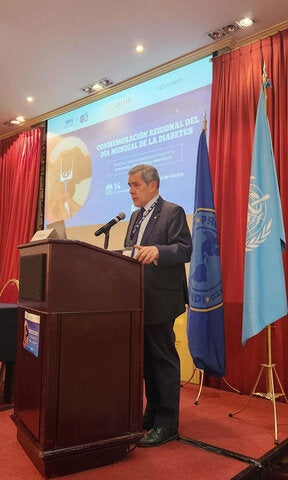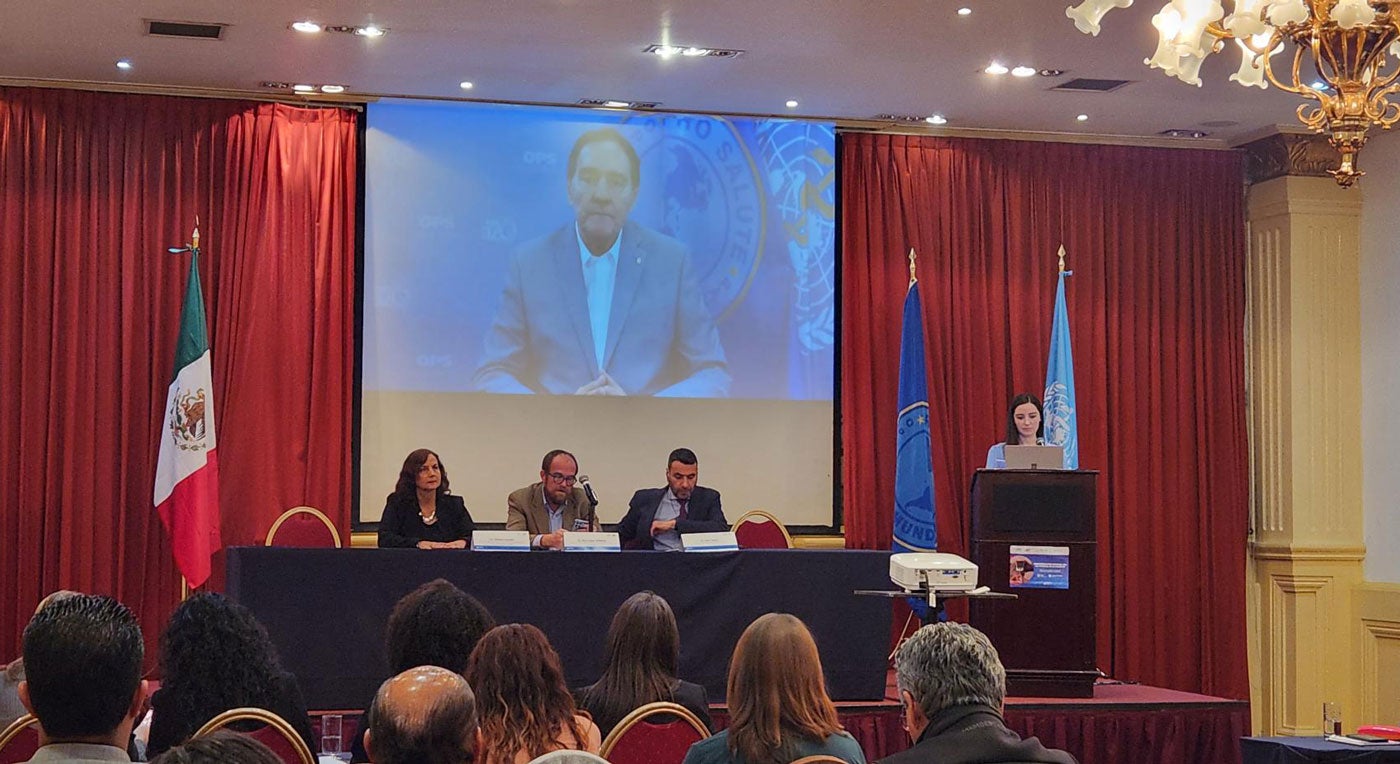
Mexico City, Nov. 14, 2023 (PAHO)- On World Diabetes Day, the Pan American Health Organization (PAHO) called for strengthening primary health care services for people with diabetes to prevent complications that can cause disability and premature death from the disease.
"The time has come to strengthen primary health care services to provide timely and quality diabetes care," said PAHO Director Dr. Jarbas Barbosa in a video message. "This includes early detection, effective management, provision of diagnostic supplies, access to life-saving medicines – such as insulin – as well as treatment for complications and guidance on diet and physical activity," he added.
The regional commemoration of World Diabetes Day took place today in Mexico City with an event attended by Dr. Ruy Lopez Ridaura, Undersecretary for Prevention and Health Promotion at the Ministry of Health in Mexico; Dr. Jose Moya, PAHO Representative in Mexico; and Slim Slama, head of the World Health Organization's (WHO) Management of Noncommunicable Diseases (NCDs) Unit. Dr. Bente Mikkelsen, Director of the NCD Department at WHO's UHC Division, sent a recorded video message.
In the Americas, about 62 million people suffer from diabetes, mainly type 2. It is estimated that about one third of people with diabetes are undiagnosed. More than 380,000 people die each year from diabetes or complications related to it.
During the COVID-19 pandemic, people with diabetes were one of the groups at highest risk of serious illness and death. At the same time, primary health care services, including those serving people with diabetes, were disrupted.
The prevalence of diabetes has also seen an accelerated increase in recent decades in the region, driven, among other factors, by high rates of obesity and overweight and changing lifestyles.
The PAHO representative in Mexico highlighted the importance of establishing public health policies for the prevention of diabetes, such as the promotion of healthier eating habits. "A great advance is the inclusion of warnings on packaging – such as the octagon labelling system – as well as taxes on sugar-sweetened beverages," he said. Dr. Moya insisted on the importance of increasing access and availability of medications and technologies for early diagnosis and adequate control of the disease, in order to prevent or delay complications. "Much progress has been made, but challenges remain," he said.
Adapting WHO recommendations to realities in countries
During the event, WHO presented an update on the Global Diabetes Pact, launched in 2021 to improve diabetes prevention and care and contribute to global targets to reduce premature mortality from noncommunicable diseases by one-third by 2030. The Compact seeks to reduce the risk of developing diabetes and ensure that all people diagnosed with the disease have access to quality, equitable and affordable care and treatment. Its overall objective is to support countries in developing, implementing, and evaluating the most cost-effective and high-impact programs to prevent and control diabetes.
"The vision of the Global Diabetes Pact can only be fully achieved when countries and regions take ownership and adapt WHO recommendations to their context," said Slama. He stressed the importance of marking this World Diabetes Day in Mexico, given that only by adapting the Pact to the regions and countries it will be possible to overcome gaps in diabetes care.
In this regard, the region of the Americas is in the process of adapting the recommendations for the care of people with diabetes at the national level. During the event, the experiences of Argentina, the Dominican Republic and Mexico were presented, which included the development of diabetes “clinical pathways” – a tool with the most important clinical recommendations for detecting, diagnosing and adequately treating the disease.
Better Care for NCDs
During the event, Silvana Luciani, head of PAHO's NCD, Violence and Trauma Unit, outlined the main components of PAHO's new "Better Care for NCDs" initiative, aimed at accelerating actions in primary health care to address diabetes and other NCDs. This initiative builds on existing efforts, such as HEARTS in the Americas, and is guided by the principle of equity, focusing on delivering health services through primary care to underserved populations.
"The idea is to have an integrated package for noncommunicable diseases, including hypertension, diabetes, asthma, cancer screening and tobacco cessation care, among others," Luciani explained. "We want to scale up and expand what is being done, starting with a needs and gaps assessment for primary care services and then expanding them.”
The new initiative is articulated through six strategies that, in addition to the initial evaluation, include the expansion of health workers' response capacity, the expansion of community work and improved access to medicines and technologies. PAHO's Strategic Fund constitutes a key mechanism for acquisition by the countries of the latter at affordable prices.
Dr. Nora Girón, regional advisor for PAHO’s Strategic Fund, presented the support that this mechanism provides to the countries in the region for the procurement of essential medicines and health technologies, together with technical assistance throughout the process. Her intervention was followed by a panel discussion on the barriers and opportunities for medicines and technologies for diabetes, in which representatives from Brazil, Chile, Cuba and Mexico participated.





